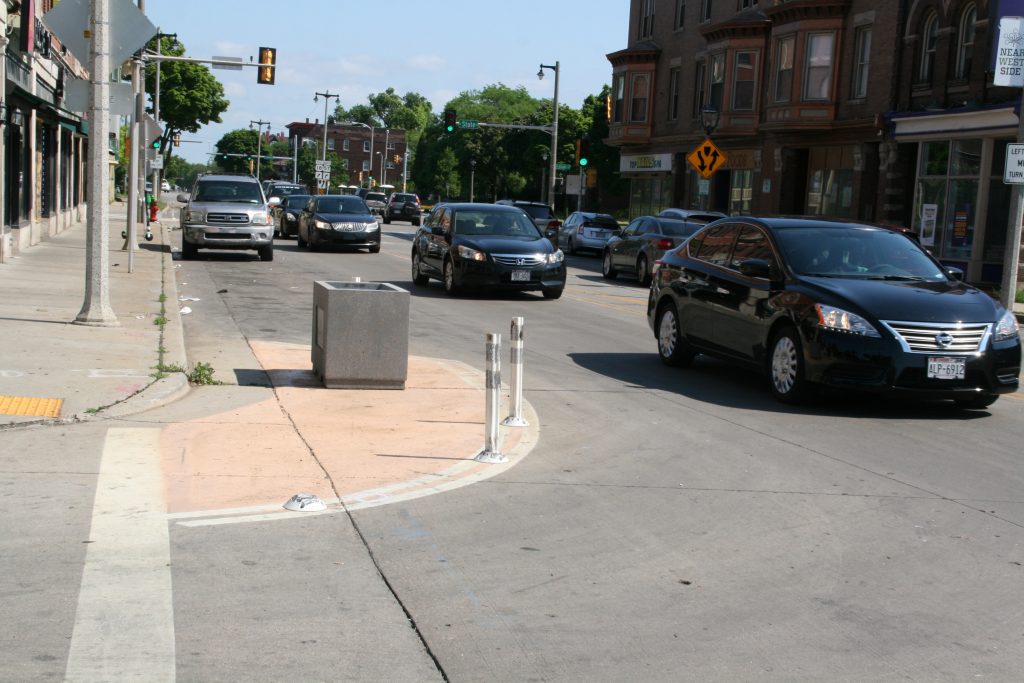Milwaukee Wins Grant To Create “Traffic Calming Lending Library”
Want to borrow a temporary traffic circle? DPW's building program to test ideas beyond speed humps.

Painted curb extensions, plastic delineators and concrete planter on N. 27th St. Photo by Jeramey Jannene.
The City of Milwaukee will soon have a lending library of traffic calming tools for residents to explore options to create safer streets.
In partnership with the Wisconsin Bike Fed, the Department of Public Works (DPW) secured a $12,000 grant from AARP Wisconsin to establish the program. It will use the funding to purchase low-cost, temporary calming options and information sheets on what permanent options are available.
The program is designed in part to demonstrate how tools other than speed humps could be used. “DPW and residents often default to installing speed humps when other options, like traffic circles or curb extensions, may more effectively address concerns. Speed humps also cannot be installed on all streets,” says the application.
The grant application says the partners will use the library in at least three locations where traffic safety concerns have already been identified. “The project team will hold a workshop with residents at each location to collect data, observe traffic safety issues, and co-create a plan to use lending library materials. On a separate date, the project team will work with residents to install lending library materials in the agreed-upon design. The project team and residents will collect data while the materials are in place. The demonstration will last several hours on one day,” says the city’s grant request.
The city also secured a $20,000 grant to support the Growing MKE initiative, which held its kickoff public meeting earlier this week. That initiative is focused on zoning changes and other built environment modifications that would allow the city to grow to one million residents.
“AARP Wisconsin is committed to working with local leaders to improve residents’ quality of life through tangible changes,” said AARP Wisconsin state director Martha Cranley in a statement announcing the grant awards. “We are proud to collaborate with this year’s grantees as they make immediate improvements in their communities to jumpstart long-term change, especially for Wisconsinites age 50 and over.”
AARP awarded $3.6 million nationwide to 310 organizations. Altoona, La Crosse, River Falls and Stevens Point were the other Wisconsin cities to win awards. Altoona, population 8,892, will use a $10,000 grant to host a design competition for accessory dwelling units (carriage units). The rear-lot houses, which could be permitted as part of Milwaukee’s Growing MKE plan, are envisioned nationally as a low-cost way to create more affordable housing. They are also known as “Granny Flats,” a nod to their suitability for seniors.
If you think stories like this are important, become a member of Urban Milwaukee and help support real, independent journalism. Plus you get some cool added benefits.
City Hall
-
Council Blocked In Fight To Oversee Top City Officials
 Dec 16th, 2025 by Jeramey Jannene
Dec 16th, 2025 by Jeramey Jannene
-
Latest Effort to Adopt New Milwaukee Flag Going Nowhere
 Dec 3rd, 2025 by Jeramey Jannene
Dec 3rd, 2025 by Jeramey Jannene
-
After Deadly May Fire, Milwaukee Adds New Safety Requirements
 Dec 2nd, 2025 by Jeramey Jannene
Dec 2nd, 2025 by Jeramey Jannene





















